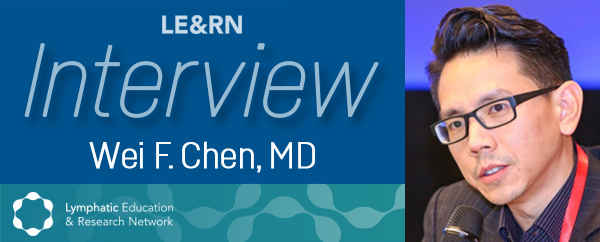Dr. Wei F. Chen is a plastic and reconstructive surgeon at University of Iowa Hospital and Clinics in Iowa City, specializing in micro surgery for people with LE. LE&RN caught up with Dr. Chen in April at the 8th World Lymphedema Surgery Symposium at Chang Gung Hospital in Tapei, Taiwan. Here Dr. Chen shares his insights into the reasons LE awareness has lagged among physicians, the obstacles surgeons face in best serving people who live with LE, and the future of lymphatic surgery.
Tell us a little bit about yourself, doctor.
I was born in Taiwan and moved to the USA with my parents when I was 12. I attended UC Berkeley and then went to med school in New York. I did my general residency (five years) in New York, moved to Chicago for my three-year plastic surgery fellowship, and then returned to Taiwan for a microsurgery fellowship at Chang Gung Hospital. It was there that I was initially exposed to lymphedema reconstruction by Dr. Ming-Huei Cheng.
What drew you to the field of lymphatics?
Every plastic surgeon will tell that we’re problem solvers. Personally, I like a challenge and when I got into surgery I wanted a specialty that involved a lot of precision. That turned out to be microsurgery, which is a subspecialty under plastic surgery. And once I got into microsurgery, I discovered Lymphedema (LE). We knew very little about it and had very few procedures at our disposal. It was such an unsolved problem that I was drawn to it.
What kind of education did you receive for LE in medical school?
I found out that I was very poorly educated about LE during my medical schooling. I thought LE was a benign problem of swelling in the arm and leg and you just sent the patient to a therapist. That’s all we were taught! We didn’t know that—untreated—LE would lead to such debilitating conditions. Quite frankly, I think we should be embarrassed about how little we know. There needs to be a change in medical school curriculum and doctors needs to be much better educated. Right now, most doctors aren’t even informed. That’s why I think an organization like LE&RN is so important because they help raise awareness among both doctors and patients.
As a LE surgeon, what challenges do you face at the University of Iowa?
LE procedures are either not covered by insurance or, when they are, poorly reimbursed. That’s the root of the problem: LE surgery simply doesn’t pay. That’s why you almost never see any plastic surgeon in private practice performing LE procedures. And that also means only university centers can offer these procedures. But they’re not charities. When they see that their surgeons doing LE surgery are underperforming financially, they’re not going to be very happy. Sure, we can say “Look what we’re doing. We’re healing all these patients and we’re giving a nice reputation to our hospital.” And for that reason, the hospital allows many of us to continue performing LE surgery. I know all LE surgeons face this problem. What we worry about, though, is that this situation will prevent younger surgeons from getting into this field or force new surgeons to leave the field. I’ve heard this already. It’s an uphill battle and I think the solution is proper recognition at a higher level: regulatory agencies, politicians, etc.
What are the rewards?
For me, I get a lot of joy helping my patients with LE as well as challenging myself and overcoming difficulties. That’s what drew me to super microsurgery in the first place. And now LE has become a main focus of my practice. LE is an unsolved problem and I really want to see this through. I would love to see the day when we can say, “This is a solved problem.” But we’re not quite there yet.
What does the future look like for lymphatic surgery?
Some of us are now harvesting just lymph vessels and sparing the lymph nodes. It seems counterintuitive that you’re going to treat someone’s LE by harvesting more lymph nodes. Instead, the premise and the goal of lymph vessel transfer means we no longer need to take the lymph nodes. We’ve been doing lymph vessel transfer for four years now. In January 2018 we presented our results for the first time and people were shocked. They were finally accepting the lymph node transfer and now we were telling them they didn’t need nodes to treat LE. We don’t know the precise mechanism of how the vessel transfer works. We have seen the efficacy of these procedures (they work well) and now we need to go back and find out why. But that’s why micro surgery is required. And just compared to what we could do 20 years ago to now is amazing.
